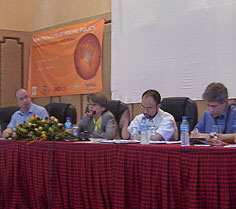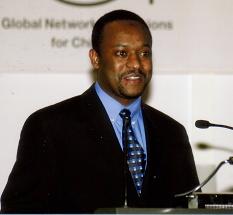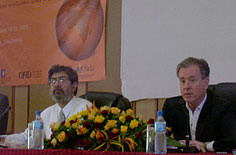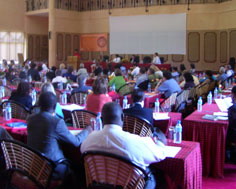..calls to make sure that social empowerment and inclusion become a center piece of the development agenda
 Leading social policy thinkers and practitioners drawn from around the world have called for drastic measures touching on social concerns to be integrated in global negotiations on education, health, poverty alleviation, aid, trade, and development. Calls to make sure that social empowerment and inclusion become a center piece of the development agenda were made at a World Bank Conference in Arusha, Tanzania. During the ‘New Frontiers of Social Policy: Development in a Globalizing World’ international conference, participants emphasized that ‘social policy must no longer be an afterthought’ but rather a development policy put at the center of all development agenda.
Leading social policy thinkers and practitioners drawn from around the world have called for drastic measures touching on social concerns to be integrated in global negotiations on education, health, poverty alleviation, aid, trade, and development. Calls to make sure that social empowerment and inclusion become a center piece of the development agenda were made at a World Bank Conference in Arusha, Tanzania. During the ‘New Frontiers of Social Policy: Development in a Globalizing World’ international conference, participants emphasized that ‘social policy must no longer be an afterthought’ but rather a development policy put at the center of all development agenda.The Vice President for Sustainable Development, World Bank, Ian Johnson said that for a very long time, and through experience, it was now clear that ‘economic growth alone is not sufficient to improve well-being and reduce poverty’. The Vice President added that it was important for economic development to ‘put people and their realities at the centre of the agenda – to respect and embrace norms, political conditions, cultures and traditions’. Participants from various international institutions were asked to look at, and take into consideration, the ethical dimensions in the huge gaps of wealth disparities existing between North and South, economic development, aid, poverty and trade relations between nation-states.
 Dr. Mustafa Ali from the Global Network of Religions for Children, GNRC Africa, participated in the Social Integration, Human Security and Social Policy Panel where conflict, violence and peace and the role of States were discussed. The World Bank and the organizations present were asked to put young members of the global community issues at the center of their social policies given that the young population, especially in the developing countries, comprised of more than 50 per cent of their total population.
Dr. Mustafa Ali from the Global Network of Religions for Children, GNRC Africa, participated in the Social Integration, Human Security and Social Policy Panel where conflict, violence and peace and the role of States were discussed. The World Bank and the organizations present were asked to put young members of the global community issues at the center of their social policies given that the young population, especially in the developing countries, comprised of more than 50 per cent of their total population. While opening the conference, Prof. Anna Tibaijuka, UN Undersecretary-General and Executive Director of HABITAT stated in her Keynote address that there existed many persistent challenges as the global socio-economic environment evolved. Prof. Tibaijuka said that the potential of many African countries was hampered by weak institutions, bad governance and not paying adequate attention to social policies.
 At the end of the conference, the participants adopted what was called the Arusha Statement which stressed on the need to involve ‘citizens in the generation of knowledge, the debate on policy formulation, and the implementation of programmes’. Other salient features in the Arusha Statement included thetransformation of people into citizens, fostering an enabling, responsive and accountable state and the need for states to mobilize revenue from their citizens and diminishing reliance on external aid.
At the end of the conference, the participants adopted what was called the Arusha Statement which stressed on the need to involve ‘citizens in the generation of knowledge, the debate on policy formulation, and the implementation of programmes’. Other salient features in the Arusha Statement included thetransformation of people into citizens, fostering an enabling, responsive and accountable state and the need for states to mobilize revenue from their citizens and diminishing reliance on external aid. Other issues discussed and included in the final statement were; enhancing market access for the poor, fostering more accessible and accountable public institutions for the provision of infrastructure, utilities services, and social services to all citizens, building strong partnerships between public institutions and representative citizens’ organizations to address the challenges of human settlements in the context of rapid urbanization and growth of urban slums, and using the rule of law to empower the poor.
 The conference was organized by the World Bank in collaboration with the United Kingdom Department for International Development (DfID), the Swedish International Development Cooperation Agency (SIDA), and the Governments of Norway and Finland. It was held from December 12th – 15th in Arusha, Tanzania, and discussed how ‘policy makers globally and especially in Africa can address current gaps’ that have been identified that may compromise achievement of the Millennium Development Goals (MDG’s) and the commitments made at the 1995 World Summit on Social Development in Copenhagen, Denmark.
The conference was organized by the World Bank in collaboration with the United Kingdom Department for International Development (DfID), the Swedish International Development Cooperation Agency (SIDA), and the Governments of Norway and Finland. It was held from December 12th – 15th in Arusha, Tanzania, and discussed how ‘policy makers globally and especially in Africa can address current gaps’ that have been identified that may compromise achievement of the Millennium Development Goals (MDG’s) and the commitments made at the 1995 World Summit on Social Development in Copenhagen, Denmark.